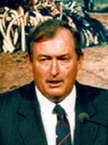 |
The Global Wildlife Wars Dr. Richard Leakey former Kenyan Minister for the Environment Friday, April 5th |
|
Who is Richard Leakey?
|
One of the most controversial, influential, and inspirational figures in African politics and world conservation today.
|
| Dr. Richard Leakey, a renowned paleoanthropologist and environmentalist, has made international headlines for his work in Kenya. He has authored or coauthored over 100 scientific articles and books, including The Origin of Humankind, Origins Reconsidered, and The Sixth Extinction. | Richard Leakey’s experience as paleontologist and conservationist offers him a unique view on our current predicament. Homo sapiens, dominant species that it has become, may be in the process of causing a biological catastrophe of immense proportions. To understand our place in the universe of things, we have to distance ourselves from our own experience, both in space and time. The sciences of evolutionary biology and ecology are at the brink of recognizing that deeper reality in life’s flow. The images are still incomplete, but they are sharp enough for us to be able for the first time to see a new reality in the world, and it represents nothing short of an intellectual revolution. Ours is a very different world from what we thought it was just a few years ago. It is now possible to look at the pattern of mass extinctions in the fossil record and see these events as a major creative force in shaping life’s flow, not simply as occasional interruptions of it. That’s new. And we can now look at the pattern of ecological communities and see how they assemble themselves and how unexpected dynamics emerge from them. That’s new, too. These novel insights from evolutionary biology and ecology are combining to cut through the deceptively simple and unimaginably complex phenomena that constitute the living world around us. Dr. Richard Leakey has made international headlines for more than 30 years for his work in Kenya. One of the most controversial, influential, and inspirational figures in African politics and world conservation today, he has authored or co-authored over 100 scientific articles and books, including The Origins of Humankind, Origins Reconsidered, and The Sixth Extinction. Renowned for his work in early human origins, Leakey became head of Kenya’s Wildlife Department and later an outspoken political outsider, to save Kenya’s natural resources, and specifically the African elephant – a crusade that set him against internal corruption, poverty, and dangerous criminals. The personal cost was high (the 1993 airplane crash that took his legs and nearly his life was likely no accident), but his love of Kenya, and his convictions about the direction of his country – and all of sub-Sahara Africa – must take to survive, have been unshakeable. |